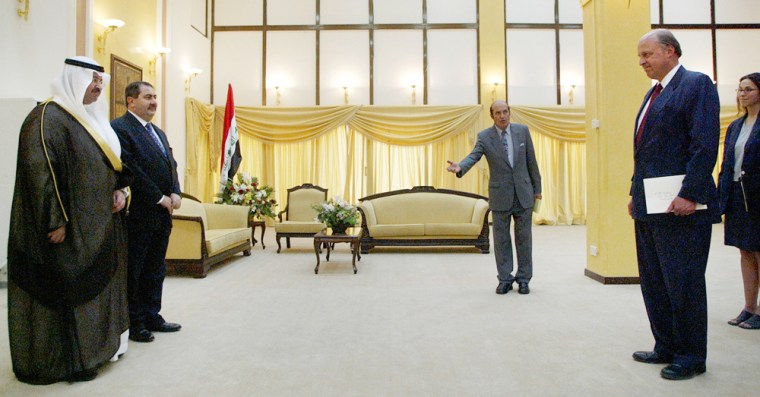The United Nations’ long and tangled involvement with Iraq took on a new twist with the handover of power to the interim Iraqi government earlier this week.
Once the U.N. Security Council unanimously passed Resolution 1546 on June 8, it legitimized the presence of the U.S.-led multinational force in post-occupation Iraq and established a framework to enable the United Nations to play a "leading role" in building democratic institutions in Iraq.
The resolution was a significant step in the transfer of sovereignty to an interim Iraqi government.
John Negroponte, former U.S. ambassador to the U.N., now U.S. envoy to Iraq, hailed the measure as “an important milestone” that “makes clear that Iraq’s sovereignty will be undiluted and that the government of Iraq will have the sovereign authority to request and decline assistance, including in the security sector.”
The resolution clarifies the U.N.’s responsibilities:
- to help convene a national conference in July 2004 to select a Consultative Council
- to advise and support Iraqis in holding elections
- to encourage national dialogue on the drafting of a new constitution
- to help the government develop “effective” civil and social services.
In addition, the U.N. will join in coordinating the delivering aid for reconstruction, development, and humanitarian assistance, promote the protection of human rights and legal reform, strengthen the rule of law, and assist in planning a national census.
Mission ripe for pitfalls
But there are real risks for the United Nations.
“He’s getting a hot potato,” said Joseph S. Nye, dean of Harvard’s Kennedy School of Government, referring to Secretary General Kofi Annan’s new responsibilities, “and has to be careful how he plays it.”
The secretary general needs to be careful he “doesn’t inherit it entirely if things do wrong — critics could say it’s the U.N.’s fault,” Nye said.
U.N. insiders are well aware of the possible dangers, yet believe that the organization is morally obligated to do what it can while hoping that the new government will have the strength and legitimacy to carry most of the load.
Much has already been accomplished, a senior U.N. official said, referring to the role played by special envoy Lakhdar Brahimi in establishing a new government and the effort by U.N. election expert Carina Perelli and her team to submit a plan for national elections in Iraq in January 2005.
In addition, Resolution 1546 directs the secretary general to appoint a special representative to oversee the U.N.’s operations in Iraq.
However, Annan’s last appointment to this position was Sergio Viera de Mello of Brazil, who was killed in a massive car-bomb attack on the U.N.’s Baghdad headquarters on Aug. 19 along with more than 20 other U.N. staff members.
Obviously, many at the United Nations worry that the next special representative and staff also could be targeted by insurgents. Resolution 1546 alludes to the security threat in a phrase making clear that the United Nations will take on its new mandate in Iraq only "as circumstances permit."
The Bush administration has publicly committed itself to create a special military unit to protect U.N. workers, but so far no countries have yet formally agreed to join it.
According to U.N. insiders, a working assumption is that the security situation is likely to diminish further in the next couple of weeks, precluding an immediately return of large numbers of U.N. staff.
“Probably we’ll have a period beyond July 1 when the U.N. will operate from outside Iraq, fly in and out as needed," the U.N. official said, speaking on condition of anonymity. Amman, the capital of neighboring Jordan, is slated to be the temporary headquarters site for the special representative.
Working through Iraqi staff
Meanwhile, on the humanitarian side, the U.N. is working through local Iraqi staff where possible.
“If the security situation improves and things settle down,” said the U.N. official, “then we will have an increased U.N. presence in Iraq and some approach to a more normal support process on the political side to help with elections.”
Technical advisers will be needed during the July-January 2005 election period. Monitoring of the elections, which requires large numbers of people, is expected to be done by Iraqis and supplemented with an outside international monitoring system, such as the Carter Center in Atlanta.
The United Nations won’t monitor the elections, officials said, because it would seem inappropriate for the U.N. to monitor a system it had helped create.
In terms of humanitarian assistance, the current thinking at the U.N. is that Iraq has “enough infrastructure, oil income, and talented people” to pick up the burden pretty quickly, allowing the U.N. agencies to leave after two years or so.
“We see quite intensive assistance activity during first couple of years and then diminution of U.N. staff as, God willing, stability returns,” the senior U.N. official said.
But that will depend on the situation. “If we’re lucky, the interim leaders will feel grateful to the U.N. for the constructive role it has played in the transition and will like and trust the special representative, and he’ll basically advise. But it’s not essential for U.N. to play such a role. If Iraqis want to do it on their own, so be it.”
Therefore, much hinges on Iraqis. “If the transitional government functions smoothly and effectively the amount of help will be less, and it becomes a matter of diplomatic style and luck for the special rep, of how he gets along with all in Baghdad.”
In a worst-case scenario, the rivalry between the Shiites, Sunnis and Kurds could feed an unstable situation, with the possibility that some members of the interim government finding it politically expedient to oppose working with the United Nations.
The fervent hope, though, is that all goes well and Iraqis elect a permanent government next January.
“With luck,” said the U.N. official, “things will gradually settle down, and maybe if settles down enough the U.N. will be out of a job, and that would be good.”
